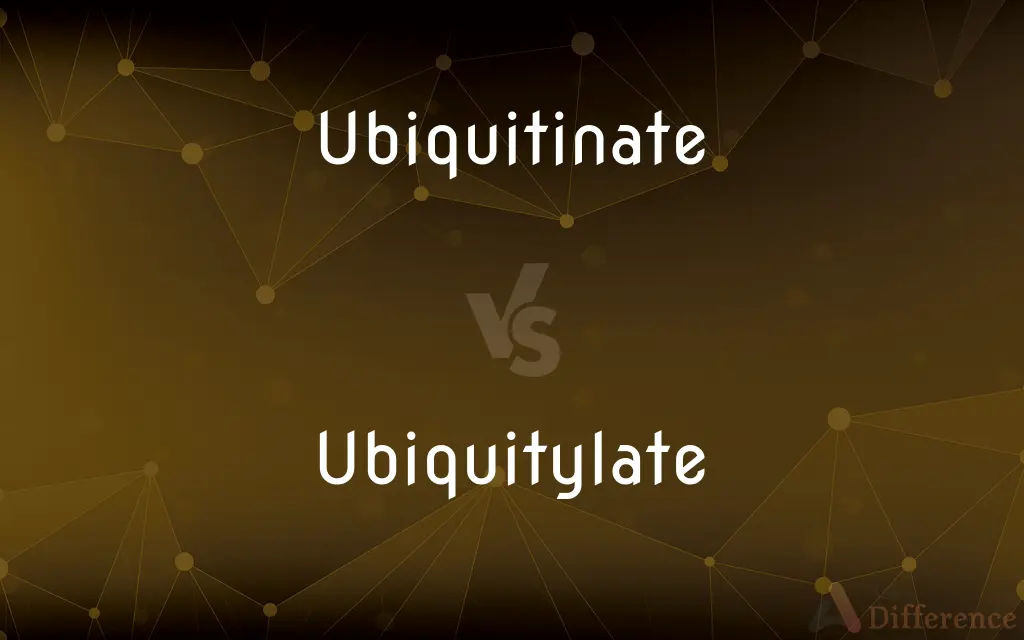Ubiquitinate vs. Ubiquitylate — What's the Difference?
By Tayyaba Rehman & Maham Liaqat — Updated on May 5, 2024
Ubiquitinate and ubiquitylate refer to the same biochemical process of attaching ubiquitin to a protein, often used interchangeably in scientific contexts.

Difference Between Ubiquitinate and Ubiquitylate
Table of Contents
ADVERTISEMENT
Key Differences
Ubiquitinate and ubiquitylate both describe the process of attaching ubiquitin, a small regulatory protein, to other proteins, a critical modification in cellular regulation. This process, known as ubiquitination or ubiquitylation, is essential for controlling protein degradation, cellular location, activity, and function.
While "ubiquitinate" has been traditionally used, "ubiquitylate" is increasingly common, reflecting a trend towards standardizing scientific terminology. Both terms involve the action of enzymes called E1, E2, and E3, which activate, conjugate, and ligate ubiquitin molecules respectively.
The ubiquitination process can lead to different outcomes for proteins, including degradation via the proteasome, alteration in cellular location, or changes in functional activity.
The usage of either term does not differ scientifically but can depend on regional preferences or journal style guides.
Both terms emphasize the enzymatic action leading to ubiquitin attachment, highlighting the dynamic nature of protein regulation in cells.
ADVERTISEMENT
Comparison Chart
Definition
Attach ubiquitin to a protein.
Attach ubiquitin to a protein.
Usage
Traditionally more common.
Increasingly used in recent literature.
Process Involved
Ubiquitination.
Ubiquitination.
Enzymatic Steps
Involves E1, E2, and E3 enzymes.
Involves E1, E2, and E3 enzymes.
Outcome
Can lead to protein degradation, etc.
Can lead to protein degradation, etc.
Compare with Definitions
Ubiquitinate
Attach ubiquitin to proteins.
The enzyme helps to ubiquitinate the faulty protein for degradation.
Ubiquitylate
Attach ubiquitin to proteins.
Enzymes ubiquitylate proteins to target them for degradation.
Ubiquitinate
Process of marking proteins.
Ubiquitinate the protein to signal it for removal.
Ubiquitylate
Modern term in proteomics.
Ubiquitylate these molecules as per the new protocol.
Ubiquitinate
Key in protein degradation pathway.
Proteins are ubiquitinated before they are broken down.
Ubiquitylate
Involved in signaling pathways.
Ubiquitylating the receptor alters its cellular location.
Ubiquitinate
A form of post-translational modification.
Ubiquitinate this protein as part of its maturation process.
Ubiquitylate
Marks proteins for cellular processes.
Once ubiquitylated, the protein moves to another cell compartment.
Ubiquitinate
Involvement in cellular regulation.
Ubiquitination is crucial for regulating protein lifespan.
Ubiquitylate
Affects protein function and stability.
To regulate its activity, the protein is ubiquitylated.
Ubiquitinate
(biochemistry) To modify a protein by attaching ubiquitin molecules.
Ubiquitylate
(biochemistry) ubiquitinate
Common Curiosities
Which term is more widely accepted in scientific literature?
Both are accepted, though "ubiquitylate" is gaining traction in recent publications.
Why are there two terms for the same process?
Linguistic variations have led to both terms being used, though they describe the same biochemical process.
Can ubiquitination be reversed?
Yes, deubiquitinating enzymes can remove ubiquitin from proteins.
What role does ubiquitination play in disease?
Dysregulation can lead to diseases, including cancer and neurodegenerative disorders.
How is ubiquitination detected in the lab?
Techniques like Western blotting and immunoprecipitation are commonly used.
What are the clinical implications of understanding ubiquitination?
It offers potential targets for therapeutic intervention in various diseases.
Is there any preference in usage between the two terms among researchers?
Usage can vary by geographical region and specific scientific communities.
Are the enzymes involved in ubiquitination the same for both terms?
Yes, the enzymatic steps involving E1, E2, and E3 enzymes are the same under both terms.
What is the main function of ubiquitination?
It primarily targets proteins for degradation and regulates various cellular functions.
How does ubiquitination affect a protein’s function?
It can lead to degradation, alter its location within the cell, or modify its activity.
Does ubiquitination only lead to degradation?
No, it can also regulate protein activity, location, and interactions without degradation.
Share Your Discovery

Previous Comparison
Foodie vs. Foody
Next Comparison
Domain vs. DemesneAuthor Spotlight
Written by
Tayyaba RehmanTayyaba Rehman is a distinguished writer, currently serving as a primary contributor to askdifference.com. As a researcher in semantics and etymology, Tayyaba's passion for the complexity of languages and their distinctions has found a perfect home on the platform. Tayyaba delves into the intricacies of language, distinguishing between commonly confused words and phrases, thereby providing clarity for readers worldwide.
Co-written by
Maham Liaqat















































